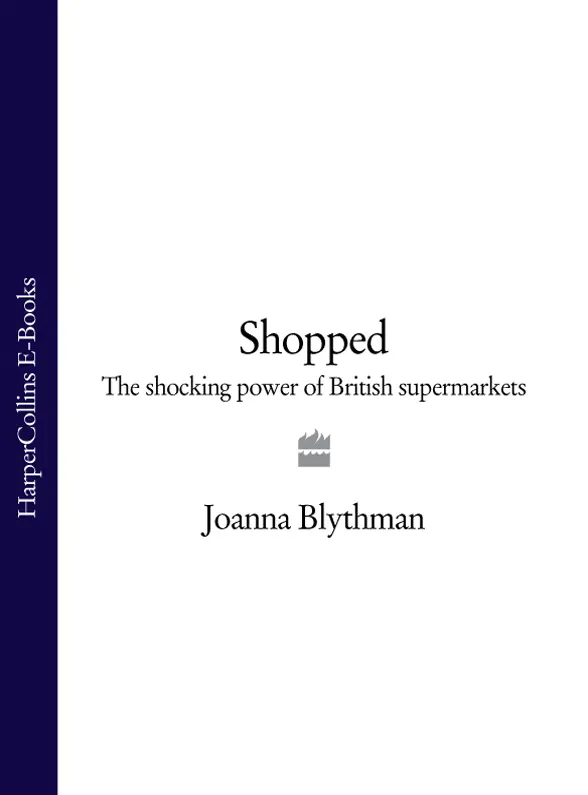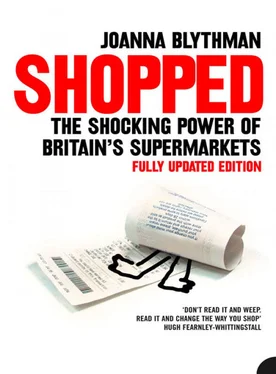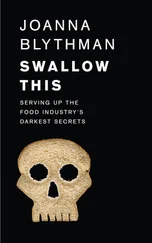
Shopped
THE SHOCKING POWER OF BRITISH SUPERMARKETS
Joanna Blythman

For Lynda and Nick
Cover
Title Page
Dedication
Supermarket starters
SUPERMARKET SPACE
1 Forgotten people
2 Trolley towns
3 Small basket
4 Working the system
5 Sugar daddies
6 Pimlico v. Sainsbury’s
SUPERMARKET FOOD
7 Giving us what we want
8 Feeding bad food culture
9 Why it all tastes the same
10 Fresh is worst
11 Permanent global summertime
12 Lost at sea
13 Bright red meat
14 Our weekly bread
15 Gastro-gap
SUPERMARKET WORKERS
16 My big welcome
17 Life on the checkout
SUPERMARKET SUPPLIERS
18 Climate of fear
19 Extracting the best deal
20 Pay to play
21 Green beans from Kenya
22 Get it in writing
23 You’ve been category managed
24 Business as usual
SUPERMARKET WORLD
25 Pruning horticulture
26 Market grab
27 A perfect world
28 Variety is not the spice of life
29 First stop Europe
30 Next stop the world
SUPERMARKET CULTURE
31 The new community
32 That’s supermarket price
33 Take our word for it
34 Safety in numbers
35 Meet the locals
36 Race to the bottom
SUPERMARKET FUTURE
37 Retail domination
38 Big day out
39 Tesco world
Supermarket solutions
Supermarket responses
Index
Acknowledgements
About the Author
Notes
Praise
By the Same Author
Copyright
About the Publisher
Leafing through this book you might get the impression that it is written by a longstanding opponent and critic of supermarkets. It might surprise you to know that actually there was a time when I pushed my trolley around the supermarket just like the next person. In common with most food shoppers, I believed that supermarkets offered a welcome addition to traditional shopping outlets – butchers, fishmongers, grocers and so on – expanding the all-round food shopping choice. I thought, naively, that supermarkets were an ‘as well as’ not ‘instead of’ feature of the retail scene.
Then in 1992 I moved to Strasbourg in France. There I shopped like a typical French person. I used small shops and food markets routinely, making a trip out of town about once a month to stock up at the hypermarket on boring items such as cat food and dishwasher salt. Naturally, when I was there, I cherry-picked any attractive special offers. But I soon learnt that to a French person – or any other European for that matter – the British idea of buying everything you need in a once-a-week supermarket shopping blitz was alien, bizarre even. The French are quite clear that although supermarkets are handy for standard items, the best food is on sale elsewhere.
Returning to the UK in 1995, I found that I was bridling at the prospect of readjusting to the prevailing supermarket-shopping pattern. Indeed, I saw it with new eyes. Several useful independent local shops had closed down in the time I had been away and just up the road, where there used to be playing fields for schoolchildren, the dreariest of Tescos had sprung up. There it was, big, ugly and floodlit twenty-four hours a day, squatting behind a brash new roundabout in a sea of new roads and concrete parking spaces. Still, it was close and convenient (or so I thought), the obvious place to head for when the milk and toilet rolls ran out.
So I used it anyway, but it was only a matter of months before I realised that shopping there was stultifying any creative urge I had to cook because I simply couldn’t find the sort of food I want to eat and feed to my family. In exasperation I started driving further to other supermarket chains, but I found myself having the same reaction. The penny dropped that what I was looking for was fresh, local, seasonal ingredients produced by a large number of small, diverse producers. What supermarkets excel at, on the other hand, is over-packaged, often over-processed, much-travelled ingredients that put two fingers up to the seasons and any notion of locality or geographical specificity.
I began to see what a spirit-crushing and alienating experience supermarket shopping actually was. How in UK chains, any given day of the year is just like every other day. How the experience of shopping in Salford is exactly like shopping in Southampton, Sheffield or Stirling. I realised that supermarket shopping was turning me into a robotic Stepford wife – minus the fixed smile. I bought the same repeat items and gritted my teeth as I made my way round the aisles on autopilot. I spent a fortune every time. My cupboards and fridge were constantly stuffed with food and yet somehow I could never think of anything to cook.
Slowly but surely I became deeply discontented with the quality of food that was on offer. I wasn’t interested in ‘Buy One Get One Free’ offers on fizzy drinks and multi-packs of flavoured crisps, which seemed to be something of a supermarket speciality. I didn’t buy much processed food and always bypassed the sprawling shelves loaded up with ready meals. I was looking for fresh, unprocessed food ingredients and I came to see that in this department UK supermarkets just didn’t deliver. Ripe fruit? That’s too much hassle for them so forget it. Properly hung meat? That takes too long and cuts profit margins, so forget that too. Decent bread without chemically hardened fats or GM enzymes? Nicely ripened cheese? Dream on. A chicken that has not stood in excrement in an overcrowded broiler shed? ‘Well, we only get two boxes of free-range/organic chicken once a week and we’ve run out and even then it’s only whole birds not chicken pieces …’ Why? ‘Because there’s not enough demand for it.’
Eventually, I got fed up with being marginalised as a cranky customer with odd and unrepresentative eating habits. My patience ran out, and on 1 January 2002, I made a New Year resolution to support the independent food sector and stop shopping routinely in supermarkets. I started revisiting independent butchers, fishmongers, cheesemongers and greengrocers with increasing relish. I rediscovered vigorous coriander in fist-sized bunches, not a few limp and olive-coloured stalks in shiny plastic. My fish was lustrous and had a sparkle in its eye, unlike the matt, flaccid specimens on the supermarket slab. I was nudged into remembering how good beef was reddish-brown, marbled with creamy fat and tender, not bright red, lean and tough. I signed up for an organic vegetable box and really looked forward to Thursdays when it was delivered to my door, just for the sheer pleasure of seeing what was different and seasonal that week. Fortnightly farmers’ markets became an unmissable event on Saturday mornings. I got to know the shopkeepers, stallholders and delivery men, and came to value my interaction with them. It’s hard to build a relationship with a low-paid, mind-numbed checkout operator or a harassed shelf-stacker. Gradually, supermarkets became a residual shopping possibility for me, generally when I had completely run out of uninteresting and heavy items.
Читать дальше














